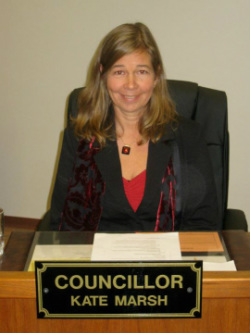Taxes in North Cowichan have been steadily increasing over the past several years while local wages have not kept pace. The unemployment rate has risen due to our poor economy, and jobs are scarce on Vancouver Island. People are finding it a hardship to pay taxes on their homes and many feel forced to sell.
If you are elected to North Cowichan Council, would you willingly listen to the concerns of your constituents and work to find ways and means of lowering taxes? How would you go about this? Do you believe it is more important to spend our tax dollars to improve the curling rink on Sherman Road or would you vote to spend those dollars on a new building to house our police detachment?
Above all - taxes need to stay affordable. We can't make life here impossible for those of us on fixed incomes. I will be constantly looking for ways to save, on our operating expenses and especially on big capital projects. For example, I'm a firm believer in joining with other public agencies whenever possible to find multiple uses for existing buildings, rather than funding new ones.
The tax increases built into the municipal budget for the next five years, factoring in expected growth in revenues, come out to about 2 % per year -- for a total of approximately 10% in five years -- if the next council carries forward the plans of the current council. To make that any lower would mean to look at cutting services or re-examining the five-year plan.
When North Cowichan is compared to all similar-size communities in BC -- apples to apples -- we currently have the 5th-lowest taxes. Comparing North Cowichan to communities that don't have to pay their policing costs (which we do), or that don't include parcel taxes and utility fees on their tax bills (which we do) is not accurate; it's comparing apples to oranges.
Telling you this doesn't mean I am saying we should be increasing taxes -- what I am saying is it is important that residents have the facts.
It is important to me to listen to all constituents and whenever possible to find ways to do more with less. Listening is one of the key commitments I am making.
If constituents want to cut services to keep taxes at lower levels, I am open to talking about that. There are many ways to look at reducing expenses. One way we can address costs is to aim for zero waste, as they are doing in the CVRD. At our household we recycle and compost everything we can. It takes us about two months to fill one garbage can for the curbside. This is an area I feel the whole municipality could improve in; if every household could cut their garbage output, a significant savings could be realized.
Communication is key -- and education is part of that communication.
Specific to the Curling Club: taxpayer money will not be spent on improving the curling rink. The Club will be leasing the building back from the municipality and will be responsible for all improvements, maintenance and upgrades.
The remaining 2-acre parcel of land -- which the municipality got for about 1/3 of its value -- is now an asset for North Cowichan taxpayers. I'd like to see it used to develop true affordable housing, including some non-market. I have been invited to help craft a plan for affordable housing in the region, under the auspices of Social Planning Cowichan, and I see this site as a potential place to actually get something done. The best social practice is mixed affordable and market housing; it's healthier for everyone involved. Identifying a similar site in Crofton would be high on my priority list.
We have much to accomplish together. Times are tough. My family were coal miners, loggers and mill workers. Working people. I learned from watching them that when times are tough we find out how strong and capable we are.
Our municipality is at a crossroad. Every decision has to balance growth with keeping taxes affordable. Every decision has to balance the rights of future generations with the needs of today.
We must always consider what we are leaving for our grandchildren, what burdens we might be laying on their shoulders and what doors we are opening for their future. One of the most effective strategies for keeping residential taxes low is to attract sustainable, high-wage industries to the area, both for their tax revenue and their ability to provide liveable wage jobs. This is a high priority of mine.
On November 19th, make a choice for change with experience. A two-term school trustee, with experience overseeing a $42 million budget, I listen and do my homework.

 RSS Feed
RSS Feed
